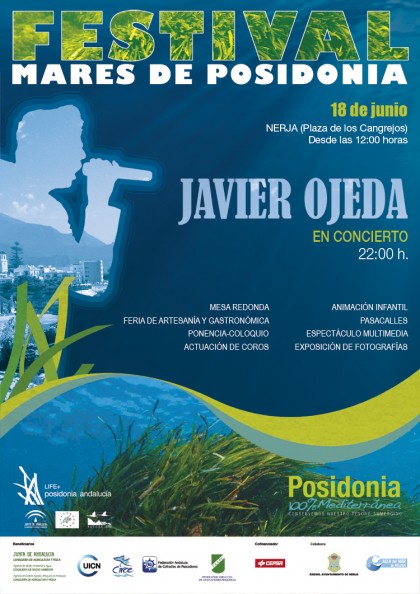
July 2011
 | July 2011 |
A Sea of posidonias | |
|---|---|
 The conservation of seagrass, which makes the Mediterranean Sea such a rich enclave in biodiversity, is essential not only for the conservation of our beaches, but also for marine species conservation. Children of many schools gathered today in the Villa de Nerja Cultural Centre, in order to learn a bit more about the value of a sea grass that only exists in the Mediterranean. To the strains of a rap song, they learnt about the treasure we have under our coasts, and that we have to protect it. Thus, the Posidonia Sea Festival in Malaga has been inaugurated with the opening of the submarine photography exposition and the official inauguration of the events that will culminate tomorrow, throughout the entire day, in the village of Nerja, with a round table for debate, parades, puppet show, gastronomy, handcraft, music, and a concert of singer Javier Ojeda, at the end of the day. José Miguel García, deputy mayor, and Nieves Atencia, town councilor of environmental affaires in the Town Hall of Nerja, declare "Nerja, with a 90% of its territory protected, is very lucky of having these oceanic Posidonia seagrass. We have to celebrate the transparency of its water, and the control of sand erosion in beaches, thanks to these submerged treasures. And it is our comittment, and our obligation, to do our best, cooperating with everyone to get a better management altogether and to release our natural patrimony, so we can keep on enjoying it". The main aim of this Festival is to make people aware of the role of prairies of fanerogame as the habitat and breeding ground of many commercial species, or in order to purify water, as well as a carbon dioxide sink. As Juan Jesús Martín, biologist of Aula del Mar, says "Posidonia is unique and multifunctional", "It takes in numerous species of every type, as the octopus or the starfish; it also acts as a nursery and hideout for fries, and it is a source of food for other species. For instance, the seahorse depends on seagrass to survive". To get a responsible social support, including children and adults acting as a key agent to preserve our seagrasses, it is essential to spread the benefits, sometimes intangible, seagrasses offer, as well as the consequences of its loss, as, for example, the repercussion in fish populations, the erosion of beaches or the worsening of tourist attractions. About the Festival The inauguration of the first edition of the Festival "Posidonia Seas", which took place the 17 and 18 of June in Nerja (Málaga), got together Andalusia΄s administrations, conservationists, biologists, media, and general public, in a common effort to spread the importance of this submarine forests to maintain a healthy coast. The Festival "Posidonia Seas" is organized by the Centre for Mediterranean Cooperation of IUCN and Aula del Mar, collaborating with Nerja΄s Town Hall (Málaga), in the framework of European project Life+ "Conservation of seagrasses of oceanic Posidonia in Andalusian Mediterranean". The culmination of the festival will be the concert of singer Javier Ojeda, and a program of activities such as submarine photography exposition, documentaries, handcraft and local gastronomy. It is also planned the table round debate about topics related with seagrass and sea biodiversity as one of the most important ecologic and economic values of the Andalusian littoral. This Festival is one of the actions of the project Life+ "Conservation of seagrasses of oceanic Posidonia in Andalusian Mediterranean", which is coordinated by the Regional Ministry of Environment of Junta de Andalucía, that is the principal beneficiary, together with other seven members: the International Union for Conservation of Nature (IUCN), Conservation, Information and Studies about Cetaceans (CIRCE), Andalusian Federation of Fishermen Guilds, Andalusian Federation of Fishing Associations, Regional Ministry of Agriculture and Fishing, the Agency of Agricultural and Fishing Management of Andalusia, and the Agency of Environment and Water of Andalusia. This project is financed by the program Life+ Nature of the European Union, and confinanced by Cepsa. LIFE+ Posidonia Andalusia focuses its actions in six Sites of Community Interest (LIC) of the Mediterranean: Cliffs of Maro Cerro Gordo, Seabeds of Punta Entinas-Sabinar, Reefs of Roquetas de Mar, Cabo de Gata Nijar, Isle of San Andrés, and Seabeds of Eastern Almería. It includes the study (cartography and monitoring or following of seagrasses), and direct preservation actions as, for instance, protection reefs against trawling, and vigilance of LIC with camera and ecologic anchor equipment. The total budget of the project is more than 3 million and a half of euros, with a LIFE contribution of a 69.48% of the total eligible costs. It will continue until 31/12/2013.
More info: mariadelmar.otero@iucn.org | |